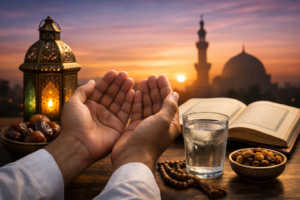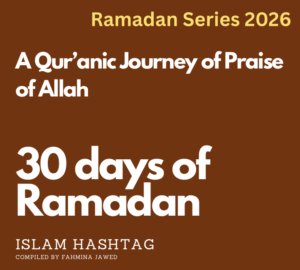Diabetic and Fasting
Fasting during the holy month of Ramadan is an important spiritual practice. When you have diabetes, you may be wondering how fasting will affect your diabetes. There is a lot of misinformation about diabetes and Ramadan. This article clears some misconception and gives few useful tips.Does everyone have to fast?No. This is based on the Holy Quran as well as the teachings of Islamic religious scholars over centuries. The Quran states that there are groups of people who do not have to fast, especially if it puts their health at risk. This includes children, pregnant or breastfeeding women, the elderly and anyone who might make themselves ill by fasting. This also includes people with poorly controlled diabetes, people with type 1 diabetes who take insulin or type 2 on a mixed insulin regimen or those who often have very high or very low blood glucose levels.I know many people with diabetes who fast and don’t have a problem. Is it okay for me? It is true, many people with diabetes can fast safely, but each person is different. Part of the decision you will make with your doctor has to do with the kind of diabetes medicine you take. It is important to schedule an appointment 2-3 months before Ramadan to discuss how fasting might affect your diabetes. Your doctor or healthcare provider may suggest a change in your medication plan.What risks should I be aware of?These are the key risks:
• Low blood glucose (or hypoglycemia) – The risk of blood glucose levels going too low is highest in people taking insulin or certain diabetes pills. Limit physical activity during fasting hours and be more active after sunset. Talk with your healthcare provider to find out if your medicine puts you at risk for low blood glucose and discuss how to prevent it.
• High blood glucose (or hyperglycemia) – While low blood glucose levels may happen during the day, after the fast is broken, there is a greater risk to overeat. Watch out for eating too many sweets and keep the portion sizes moderate. Even though Ramadan is known as a time of fasting – it is not uncommon for people to gain weight during this month, as in some families, every evening meal is a celebration.
• Dehydration – This is especially a problem during the longer and hotter summer days. Aim to drink sugar free and caffeine free drinks frequently throughout the evening and before dawn.I was told to not check my blood glucose during the day as it will break the fast. Is that true?
It is true, many people with diabetes can fast safely, but each person is different. Part of the decision you will make with your doctor has to do with the kind of diabetes medicine you take. It is important to schedule an appointment 2-3 months before Ramadan to discuss how fasting might affect your diabetes. Your doctor or healthcare provider may suggest a change in your medication plan.What risks should I be aware of?These are the key risks:
• Low blood glucose (or hypoglycemia) – The risk of blood glucose levels going too low is highest in people taking insulin or certain diabetes pills. Limit physical activity during fasting hours and be more active after sunset. Talk with your healthcare provider to find out if your medicine puts you at risk for low blood glucose and discuss how to prevent it.
• High blood glucose (or hyperglycemia) – While low blood glucose levels may happen during the day, after the fast is broken, there is a greater risk to overeat. Watch out for eating too many sweets and keep the portion sizes moderate. Even though Ramadan is known as a time of fasting – it is not uncommon for people to gain weight during this month, as in some families, every evening meal is a celebration.
• Dehydration – This is especially a problem during the longer and hotter summer days. Aim to drink sugar free and caffeine free drinks frequently throughout the evening and before dawn.I was told to not check my blood glucose during the day as it will break the fast. Is that true? Checking blood glucose will not break a fast! It is important to monitor blood glucose levels especially to identify a low glucose level. A fast will have to be ended if glucose levels fall too low (below 70 mg/dl)How is low blood glucose treated?If glucose levels do fall below 70, take 15 grams of carbohydrate in the form of one of these: 4 glucose tablets, 6 oz regular soda, 4 oz fruit juice or 1 tube glucose gel. Wait 15 minutes and recheck again. Follow with a snack if the evening meal is not for more than an hour.Do I stop taking medicine during Ramadan?
Checking blood glucose will not break a fast! It is important to monitor blood glucose levels especially to identify a low glucose level. A fast will have to be ended if glucose levels fall too low (below 70 mg/dl)How is low blood glucose treated?If glucose levels do fall below 70, take 15 grams of carbohydrate in the form of one of these: 4 glucose tablets, 6 oz regular soda, 4 oz fruit juice or 1 tube glucose gel. Wait 15 minutes and recheck again. Follow with a snack if the evening meal is not for more than an hour.Do I stop taking medicine during Ramadan? No. You continue taking your diabetes medicine, but you will take it at different times. Your dose may also change. This is one reason why it is very important to talk with your healthcare provider several months before Ramadan so you can plan ahead for how your diabetes medicines may need to change.How do I plan my meals since I’m only eating twice a day?
No. You continue taking your diabetes medicine, but you will take it at different times. Your dose may also change. This is one reason why it is very important to talk with your healthcare provider several months before Ramadan so you can plan ahead for how your diabetes medicines may need to change.How do I plan my meals since I’m only eating twice a day? The dawn meal (Suhoor) should contain a balance of whole grain sources of starchy carbohydrates as well as some protein and fat to help slow the digestion and help the feeling of fullness last as long as possible into the day. Healthy breakfast options good for the hot summer month of Ramadan include:
• Whole grain cereal, low-fat milk, cottage cheese with sliced peaches topped with toasted almonds
• Plain Greek Yogurt flavored with blueberries and cinnamon, whole wheat toast with nut butter.
• Foul (a hearty middle eastern breakfast dish made of lentils or fava beans), small serving of sliced fruit
• Whole wheat roti (unleavened bread) and egg khagina (a southeast Asian dish)
The dawn meal (Suhoor) should contain a balance of whole grain sources of starchy carbohydrates as well as some protein and fat to help slow the digestion and help the feeling of fullness last as long as possible into the day. Healthy breakfast options good for the hot summer month of Ramadan include:
• Whole grain cereal, low-fat milk, cottage cheese with sliced peaches topped with toasted almonds
• Plain Greek Yogurt flavored with blueberries and cinnamon, whole wheat toast with nut butter.
• Foul (a hearty middle eastern breakfast dish made of lentils or fava beans), small serving of sliced fruit
• Whole wheat roti (unleavened bread) and egg khagina (a southeast Asian dish) Traditionally the fast is broken (Iftar) after sunset and begins with the eating of dates and drinking water. Limit dates to 1-2 each evening. Drink plenty of water and sugar free beverages though out the evening, but avoid caffeine beverages as they can be dehydrating.While the iftar meal is a celebration time, aim to not overeat. Discuss a plan with your dietitian. Keep sensible portions in mind and follow the same guidelines for healthy eating that you do the rest of the year with an emphasis on whole grains, lean sources of meat, fish and poultry, small amounts of heart healthy fats and limit added sugars.
Traditionally the fast is broken (Iftar) after sunset and begins with the eating of dates and drinking water. Limit dates to 1-2 each evening. Drink plenty of water and sugar free beverages though out the evening, but avoid caffeine beverages as they can be dehydrating.While the iftar meal is a celebration time, aim to not overeat. Discuss a plan with your dietitian. Keep sensible portions in mind and follow the same guidelines for healthy eating that you do the rest of the year with an emphasis on whole grains, lean sources of meat, fish and poultry, small amounts of heart healthy fats and limit added sugars.
Hope the information helps.ZAZAKALLAH KHAIRAN. It is true, many people with diabetes can fast safely, but each person is different. Part of the decision you will make with your doctor has to do with the kind of diabetes medicine you take. It is important to schedule an appointment 2-3 months before Ramadan to discuss how fasting might affect your diabetes. Your doctor or healthcare provider may suggest a change in your medication plan.What risks should I be aware of?These are the key risks:
• Low blood glucose (or hypoglycemia) – The risk of blood glucose levels going too low is highest in people taking insulin or certain diabetes pills. Limit physical activity during fasting hours and be more active after sunset. Talk with your healthcare provider to find out if your medicine puts you at risk for low blood glucose and discuss how to prevent it.
• High blood glucose (or hyperglycemia) – While low blood glucose levels may happen during the day, after the fast is broken, there is a greater risk to overeat. Watch out for eating too many sweets and keep the portion sizes moderate. Even though Ramadan is known as a time of fasting – it is not uncommon for people to gain weight during this month, as in some families, every evening meal is a celebration.
• Dehydration – This is especially a problem during the longer and hotter summer days. Aim to drink sugar free and caffeine free drinks frequently throughout the evening and before dawn.I was told to not check my blood glucose during the day as it will break the fast. Is that true?
It is true, many people with diabetes can fast safely, but each person is different. Part of the decision you will make with your doctor has to do with the kind of diabetes medicine you take. It is important to schedule an appointment 2-3 months before Ramadan to discuss how fasting might affect your diabetes. Your doctor or healthcare provider may suggest a change in your medication plan.What risks should I be aware of?These are the key risks:
• Low blood glucose (or hypoglycemia) – The risk of blood glucose levels going too low is highest in people taking insulin or certain diabetes pills. Limit physical activity during fasting hours and be more active after sunset. Talk with your healthcare provider to find out if your medicine puts you at risk for low blood glucose and discuss how to prevent it.
• High blood glucose (or hyperglycemia) – While low blood glucose levels may happen during the day, after the fast is broken, there is a greater risk to overeat. Watch out for eating too many sweets and keep the portion sizes moderate. Even though Ramadan is known as a time of fasting – it is not uncommon for people to gain weight during this month, as in some families, every evening meal is a celebration.
• Dehydration – This is especially a problem during the longer and hotter summer days. Aim to drink sugar free and caffeine free drinks frequently throughout the evening and before dawn.I was told to not check my blood glucose during the day as it will break the fast. Is that true? Checking blood glucose will not break a fast! It is important to monitor blood glucose levels especially to identify a low glucose level. A fast will have to be ended if glucose levels fall too low (below 70 mg/dl)How is low blood glucose treated?If glucose levels do fall below 70, take 15 grams of carbohydrate in the form of one of these: 4 glucose tablets, 6 oz regular soda, 4 oz fruit juice or 1 tube glucose gel. Wait 15 minutes and recheck again. Follow with a snack if the evening meal is not for more than an hour.Do I stop taking medicine during Ramadan?
Checking blood glucose will not break a fast! It is important to monitor blood glucose levels especially to identify a low glucose level. A fast will have to be ended if glucose levels fall too low (below 70 mg/dl)How is low blood glucose treated?If glucose levels do fall below 70, take 15 grams of carbohydrate in the form of one of these: 4 glucose tablets, 6 oz regular soda, 4 oz fruit juice or 1 tube glucose gel. Wait 15 minutes and recheck again. Follow with a snack if the evening meal is not for more than an hour.Do I stop taking medicine during Ramadan? No. You continue taking your diabetes medicine, but you will take it at different times. Your dose may also change. This is one reason why it is very important to talk with your healthcare provider several months before Ramadan so you can plan ahead for how your diabetes medicines may need to change.How do I plan my meals since I’m only eating twice a day?
No. You continue taking your diabetes medicine, but you will take it at different times. Your dose may also change. This is one reason why it is very important to talk with your healthcare provider several months before Ramadan so you can plan ahead for how your diabetes medicines may need to change.How do I plan my meals since I’m only eating twice a day? The dawn meal (Suhoor) should contain a balance of whole grain sources of starchy carbohydrates as well as some protein and fat to help slow the digestion and help the feeling of fullness last as long as possible into the day. Healthy breakfast options good for the hot summer month of Ramadan include:
• Whole grain cereal, low-fat milk, cottage cheese with sliced peaches topped with toasted almonds
• Plain Greek Yogurt flavored with blueberries and cinnamon, whole wheat toast with nut butter.
• Foul (a hearty middle eastern breakfast dish made of lentils or fava beans), small serving of sliced fruit
• Whole wheat roti (unleavened bread) and egg khagina (a southeast Asian dish)
The dawn meal (Suhoor) should contain a balance of whole grain sources of starchy carbohydrates as well as some protein and fat to help slow the digestion and help the feeling of fullness last as long as possible into the day. Healthy breakfast options good for the hot summer month of Ramadan include:
• Whole grain cereal, low-fat milk, cottage cheese with sliced peaches topped with toasted almonds
• Plain Greek Yogurt flavored with blueberries and cinnamon, whole wheat toast with nut butter.
• Foul (a hearty middle eastern breakfast dish made of lentils or fava beans), small serving of sliced fruit
• Whole wheat roti (unleavened bread) and egg khagina (a southeast Asian dish) Traditionally the fast is broken (Iftar) after sunset and begins with the eating of dates and drinking water. Limit dates to 1-2 each evening. Drink plenty of water and sugar free beverages though out the evening, but avoid caffeine beverages as they can be dehydrating.While the iftar meal is a celebration time, aim to not overeat. Discuss a plan with your dietitian. Keep sensible portions in mind and follow the same guidelines for healthy eating that you do the rest of the year with an emphasis on whole grains, lean sources of meat, fish and poultry, small amounts of heart healthy fats and limit added sugars.
Traditionally the fast is broken (Iftar) after sunset and begins with the eating of dates and drinking water. Limit dates to 1-2 each evening. Drink plenty of water and sugar free beverages though out the evening, but avoid caffeine beverages as they can be dehydrating.While the iftar meal is a celebration time, aim to not overeat. Discuss a plan with your dietitian. Keep sensible portions in mind and follow the same guidelines for healthy eating that you do the rest of the year with an emphasis on whole grains, lean sources of meat, fish and poultry, small amounts of heart healthy fats and limit added sugars.Ramadan Offer
Discover more from Islam Hashtag
Subscribe to get the latest posts sent to your email.




